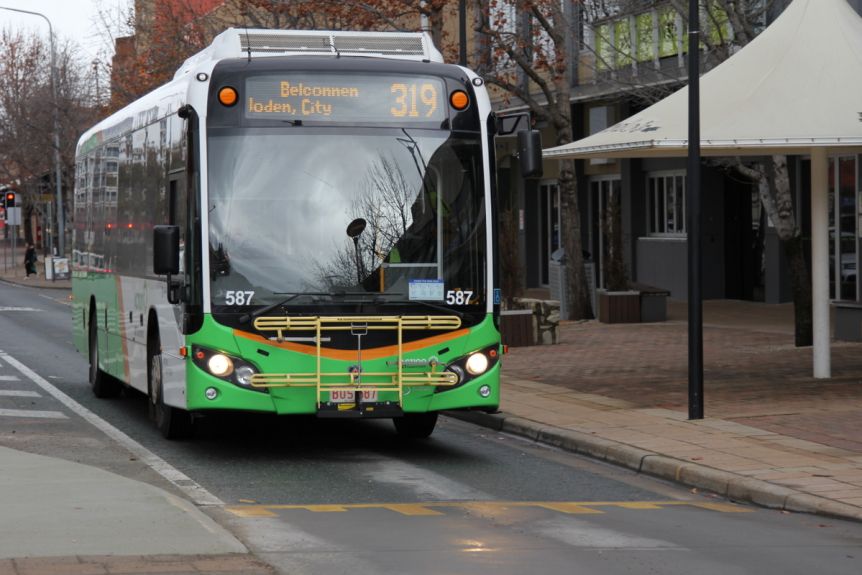Disappointed by reductions in off-peak bus services beginning next year, the ACT Greens, Labor’s partner in government, have called for more bus drivers to maintain off-peak services.
ACT transport minister Chris Steel insists that cuts to bus services in term one next year, revealed in a new timetable released this week, are a temporary response to the light rail disruption.
Most rapid bus services have been reduced to a 30-minute frequency after 7pm; all other rapids will continue to operate at least every 15 minutes, a Transport Canberra spokesperson said on Tuesday. Local routes have been reduced to an hourly frequency during off-peak periods; there will be no change to local service frequency during peak periods. Operating hours for rapid services at night have been reduced; no trips will begin after 11pm.
But Canberra Liberals MLA Mark Parton, Shadow Minister for Transport, pointed out that the new timetable revealed a significant reduction of trips on many routes (many cut by 10 or more runs); night services will finish earlier across many routes, “which will mean that many workers will not be able to get the bus home after 8pm”; and weekend buses will continue to operate every two hours, despite government promises to increase weekend frequency.
“The new timetable responds to the disruption, and focuses on reliability and delivering frequency during peak periods,” Mr Steel said today.
“The extra journey time has to be factored into the timetable, and will result in a temporary reduction in the number of bus services which can be operated, particularly in off-peak times. Once we have monitored the actual impact on bus run times, during the next phase of construction, we will consider an uplift in services in the second half of 2023.”
- Canberra buses given the kiss-off (14 December)
“I’m glad the new 2023 timetable will maintain good reliability and servicing for peak routes,” Jo Clay MLA, Greens spokesperson for transport, said. “People will be able to commute to work and get to school. There’s plenty of room on those services, and they’re a really convenient option.
“But I’m disappointed we haven’t recruited enough drivers to maintain off-peak services and give us hourly weekend travel at the start of 2023. In May this year, the Assembly passed my motion to recruit enough drivers so that we can return to the regular timetable in 2022 and provide hourly weekend services in 2023. We should have seen this in our new timetables.”
“A bold call from Jo Clay,” Mr Parton remarked.
“I would remind Ms Clay that she is the government. In the term so far, the Greens have not voted with the opposition against Labor once. The Greens are not a cross bench, they are the government.
“If your government isn’t hiring enough drivers, then do something about it.
“And if I hadn’t raised the sneaky timetable cuts, I doubt that Ms Clay or the Greens would even have been aware of them.”
Ms Clay continued: “We need a public transport system that is available when and where it is needed.
“A public transport network that more people use is one that helps with cost of living, congestion, and climate. Canberrans want a public transport network that gets us where we need to go, when we need to get there. We need better investment and forward planning to do that,” she said.
“I’m really worried about people who rely on our off-peak services. Those who move around the suburb or from one town centre to another, those who visit friends or have medical appointments or take late-night shifts, they all rely on this network. We need to look after everyone. We particularly need to look after vulnerable Canberrans who need the bus to access daily life.
“We all understand that traffic will necessarily be disrupted during the construction of Light Rail Stage 2a. This affects journey times for buses as well as cars.
“I was pleased when the Transport Minister [Chris Steel] established a Disruption Taskforce to manage this. Canberrans were encouraged to use active transport, public transport, and flexible travel planning. It’s a real opportunity to change the way we move around our city. This matters to our daily lives, because traffic jams and the cost of petrol are a real problem for many of us. It also matters for the climate. Our latest greenhouse gas inventory shows transport emissions are still around 63 per cent of our tracked emissions. We need to do better,” Ms Clay said.



